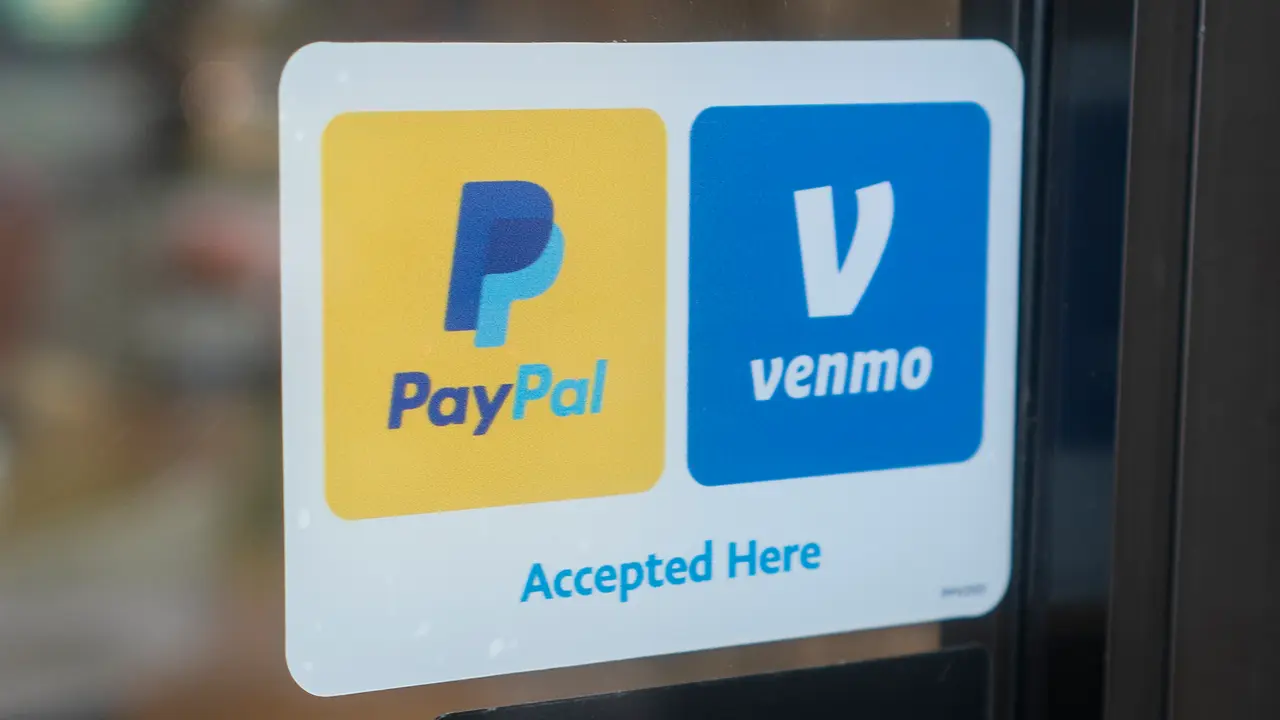 ENS Domains has announced the launch of Namechain, a purpose-built Layer 2 solution that marks a significant evolution in the Ethereum Name Service (ENS) ecosystem. This development is part of the broader ENS v2 initiative, aimed at reducing costs and enhancing performance for users. The team hopes that by providing a familiar experience for Ethereum […]
ENS Domains has announced the launch of Namechain, a purpose-built Layer 2 solution that marks a significant evolution in the Ethereum Name Service (ENS) ecosystem. This development is part of the broader ENS v2 initiative, aimed at reducing costs and enhancing performance for users. The team hopes that by providing a familiar experience for Ethereum […]
Two prominent payment platforms are offering their support for Ethereum Name Service (ENS) domains. In a new thread on the social media platform X, payment giants PayPal and Venmo are now supporting the ENS domain naming service, which allows users to forgo having to use complicated crypto wallet addresses and instead adopt a representative username. […]
The post PayPal and Venmo To Offer Support for Ethereum Name Service (ENS) Starting With Users in the US appeared first on The Daily Hodl.
 Ethereum Name Service (ENS) has announced that the payment giants Paypal and Venmo have integrated support for ENS domain names. This integration enables users to employ Paypal and Venmo to transmit crypto assets to an ENS address. Paypal and Venmo Roll out ENS Support On Tuesday, ENS shared on the social media platform X that […]
Ethereum Name Service (ENS) has announced that the payment giants Paypal and Venmo have integrated support for ENS domain names. This integration enables users to employ Paypal and Venmo to transmit crypto assets to an ENS address. Paypal and Venmo Roll out ENS Support On Tuesday, ENS shared on the social media platform X that […] Frax Finance has launched the Frax Name Service (FNS), a decentralized identity service that allows users to register unique names on the Frax blockchain. Frax Finance Expands Ecosystem With Launch of Frax Name Service Frax Finance has introduced the Frax Name Service (FNS), a decentralized identity service designed specifically for the Frax ecosystem. FNS is […]
Frax Finance has launched the Frax Name Service (FNS), a decentralized identity service that allows users to register unique names on the Frax blockchain. Frax Finance Expands Ecosystem With Launch of Frax Name Service Frax Finance has introduced the Frax Name Service (FNS), a decentralized identity service designed specifically for the Frax ecosystem. FNS is […] On Tuesday, Bitwise Investments disclosed a collection of Ethereum Name Service (ENS) subnames for its ethereum reserve holding wallets. Bitwise emphasized that this level of transparency is unique to cryptocurrency, allowing the public to easily verify the firm’s net assets. Bitwise Leads in Transparency by Publishing Ethereum ETF Addresses At 7:50 a.m. EDT on Tuesday, […]
On Tuesday, Bitwise Investments disclosed a collection of Ethereum Name Service (ENS) subnames for its ethereum reserve holding wallets. Bitwise emphasized that this level of transparency is unique to cryptocurrency, allowing the public to easily verify the firm’s net assets. Bitwise Leads in Transparency by Publishing Ethereum ETF Addresses At 7:50 a.m. EDT on Tuesday, […]
Unstoppable Domains and Ethereum Name Service have dominated the decentralized domain name space as competitors — until now.
Two of the biggest platforms powering Web3 decentralized domains have partnered up after Unstoppable Domains announced support for .eth domain names from the Ethereum Name Service (ENS).
The two service providers have been central pillars in the Web3 domain space, allowing users to create human-readable domain names and cryptocurrency wallet addresses. Decentralized domains also act as a profile across the Web3 ecosystem, unlocking a host of functionalities.
.eth is coming to Unstoppable.
— unstoppable.polygon (@unstoppableweb) July 17, 2023
Unstoppable is now your one-stop shop for Web3 domains. Buy and manage your .eth, .nft, or .x domains all in one place.
Better yet? We’re introducing new functionality that makes buying .eth domains easier and more seamless.
pic.twitter.com/lKB5yNwuD7
As Cointelegraph previously explored, Unstoppable Domains and ENS accounted for a combined six million domain registrations in early 2023, with registrations increasing markedly from 2022 onwards.
Users can now buy .eth names through Unstoppable with added payment methods and functionality to streamline the management of ENS domains. All .eth domains purchased from Unstoppable will be registered through the ENS smart contract and have the same functionality as those registered directly through ENS.
Related: State of play: Decentralized domain services reflect on industry progress
Users can also purchase .eth domains through Unstoppable without connecting them to an existing Ether (ETH) wallet. This is provisioned for by Unstoppable Vault, a noncustodial offering that allows users to secure Web3 domains without initially having a cryptocurrency wallet.
ENS users can also take advantage of an auto-renewal mechanism through Unstoppable, canceling out the need to renew .eth domains on-chain and the possibility of losing a domain as a result.
The integration with Unstoppable also allows .eth users to purchase their desired Web3 domain with several different payment methods, from Bitcoin (BTC) and 12 different cryptocurrencies to conventional fiat payment options, including credit cards, PayPal, Google Pay and Apple Pay.
Unstoppable is also developing .eth domain management tools, which will include the ability to set cryptocurrency addresses, manage on-chain profile data and transfer .eth domains.
An announcement shared with Cointelegraph highlights that users who buy .eth domains through Unstoppable can use ENS integrations. However, .eth domains purchased through Unstoppable will not function with Unstoppable’s 800 or so integrations.
Unstoppable also supports a number of Web3 domains including .nft, .crypto, .wallet, .dao, .bitcoin, .polygon, .BinanceUS and .blockchain.
Magazine: Ordinals turned Bitcoin into a worse version of Ethereum: Can we fix it?

New developments such as free usernames, cross-chain names, and chat functions may lead to more addresses being associated with a name.
Ever since the Ethereum Name Service (ENS) was launched in 2017, Web3 users have been able to replace the long strings of characters that make up a crypto address with a more easily memorized blockchain username or Web3 domain name. For example, Ethereum (ETH) users can now send crypto to the network’s founder, Vitalik Buterin, at his username of vitalik.eth without knowing that his address is 0xd8da6bf26964af9d7eed9e03e53415d37aa96045.
But despite this advancement making it much easier to identify users, hardly anyone has taken advantage of it. There are over 200 million unique addresses on Ethereum, yet only 2.2 million .eth names were registered as of January. This means that at least 97% of Ethereum addresses are not associated with an ENS username.
This lack of usernames creates user experience problems in the Web3 ecosystem. Just imagine if early email addresses had consisted of long strings of characters that looked like 0x7a16ff8270133f063aab6c9977183d9e72835428 or 0x3A7937851d67Ee2f51C959663749093Dc87D9C9a. If this had been the case, Email may not have survived as a practice.
But despite this initial lack of adoption, there is some evidence that the tide may be turning in favor of Web3 usernames. A few recent advancements in wallet and messaging apps may onboard more users than ever before.
One of these advancements is better wallet integration with free usernames.
Wallets have had the ability to understand Web3 names for a long time. According to Metamask’s changelog, it introduced the ability to send to a .eth name in October, 2017, right after ENS launched. Other wallets have followed suit with this feature, including Coinbase wallet, Trustwallet, and others. Some of these wallets have also integrated with ENS rivals Unstoppable Domains, Space ID, Bonfida and others.
However, these wallets still show a crypto address to users by default, as new users don’t typically receive names automatically.
In order for a user to receive crypto via their Web3 name, they need to first register a username with a particular name provider. This means figuring out which provider to use, navigating to the providers interface, and going through the process of registering.
To make matters worse, names can be expensive. ENS names typically cost $5 and expire after a year, while Unstoppable Domains names that do not need to be renewed typically cost from $20-$40. Compare this with how easy it is to sign up for an email address for free using Gmail, Outlook, Yahoo. etc., and it’s easy to see why most crypto users don’t have a Web3 username.
A few wallet apps have been trying to solve this problem by giving away free domain names to their users. For example, Coinbase wallet allows new users to register a single .cb.id username for free, once per year, and Kresus wallet offers its users a free .kresus username of up to 8 characters as well.
This practice of giving out free usernames has begun only recently. And some popular wallets like Trustwallet and Metamask still don’t offer the feature. But as more users onboard to the Web3 ecosystem, this may lead to greater adoption of Web3 usernames over time.
Another recent advancement is instant messaging integration.
Some messaging apps have begun to implement Web3 names as usernames, increasing these names’ utility beyond the payments use-case. One example is Blockscan Chat. It allows users to send instant messages to any Ethereum address or ENS username.

Caption: Blockscan Chat interface. Source: Blockscan
When messages are sent using Blockscan chat, they produce alerts on the Etherscan block explorer. If the recipient sees the alert and logs into the app, they are able to read the message. The developer of the app claims that all of its messages are end-to-encrypted. So although anyone can see if a particular user has received a message, only the sender and recipient can read it.
Web3 usernames aren’t an absolute necessity for using Blockscan chat, as it does allow users to send messages to crypto addresses as well. But names do make it much easier for users to find each other in the app.

Another example is Grill.chat, a messaging app running on the Subsocial (SUB) network. When a user first signs up for it, they are assigned a random username. But they can optionally attach an Ethereum wallet to their account. If they do this, the app automatically converts their random username into their .eth username.
Being able to find other users to chat with via their web3 usernames is arguably a more useful feature than being able to send crypto with them.
After all, the crypto community is still small. If a crypto user needs money from friends or family, they may be better off right now using traditional Web2 apps like Venmo or Apple Pay, as their friends and family may not know how to use a Web3 wallet. But if a person wants to chat specifically about crypto and Web3 apps, being able to look them up by their username could turn out to be a huge advantage. This added use-case may entice more users to adopt Web3 names in the future.
Another recent advancement in Web3 names is cross-chain names.
When Web3 names were first invented, ENS was the only protocol that could be used to create them, and it could only be used on Ethereum.
But the Web3 ecosystem has since grown to encompass many different chains. And as the number of chains has grown, so has the number of naming protocols. Users can now register Polygon (MATIC) usernames from Unstoppable Domains, Solana (SOL) ones from Bonfida, and both Arbitrum One (ARB) and BNB Chain (BNB) names from Space ID.
This fragmentation across chains can make integration difficult for wallets and block explorers and cause confusion for users. For example, suppose that a person’s Polygon username is newton.crypto. But when they go to register the same name on BNB Chain, they find that newton.bnb is already taken, so they register einstein.bnb instead. When a user looks at this person’s address on a block explorer, either name could appear, depending on which one the developer of the block explorer has chosen to display. And regardless of which one is displayed, it could cause confusion for users.
In this case for example, if a user wants to send crypto to newton.crypto via BNB Chain, they may easily send it to newton.bnb instead, which will turn out to be the wrong recipient.
A few Web3 companies are trying to fix this problem by creating a single name for each identity across multiple chains. For example, the Redefined app allows users to register for a username on Arbitrum One, but use it to receive funds on 8 other chains: Polygon, Optimism (OP), BNB Chain, Solana, Bitcoin (BTC), Fantom (FTM), Moonbeam (GLMR) and Near.
To make this feature possible, Redefined lets the user write an address or username for each network into the Arbitrum smart contract through a “manage” tab within the app. Once the addresses are listed in the contract, any person can initiate a transaction to the correct address using a “send” function within the app. In order to send funds, the sender only needs to know the recipient’s Redefined username, not the recipient’s name or address on any particular chain.
Redefined usernames begin with an @ and do not have extensions. For example, @newton and @einstein are possible redefined usernames.
Did.id, also called “.bit,” is a similar project that runs on the Nervos network. It allows users to register for a .bit username that works across 39 different networks, including Bitcoin, Ethereum, Polygon, Solana, Bitcoin Cash (BCH), Internet Computer (ICP), and many others. Registration can be done directly with a Nervos network wallet or indirectly using Polygon.
Did.id doesn’t feature a user interface with a “send” function. However, it is integrated with nine different wallet apps, including imToken, Tokenpocket, MathWallet, Huobi Wallet, Bitkeep, HyperPay, AlphaWallet, ViaWallet, and MIBAO. So it’s available to senders who use these wallets.
Cross-chain usernames are yet another new development that may spur greater adoption of Web3 usernames over time.
Despite these advancements, it’s still not clear how long mass adoption of Web3 usernames will take. Right now, over 90% of Web3 addresses are not associated with any username. So there is a huge hill to climb in terms of adoption. And in the meantime, users still need to cut and paste a complicated string of characters to find a person’s Web3 identity.
There is also still plenty of friction left for users, including the continuing high cost of registering a name for users of most wallet apps.
Even so, these advancements may pave the way for the mass adoption of Web3 usernames at some point in the future.

Ethereum Name Service has integrated fiat payment options for new decentralized domain registrations in a new partnership with MoonPay.
Web3 users can now register decentralized .eth domains on the Ethereum Name Service (ENS) protocol using a host of fiat payment options, including Apple Pay, and Google Pay, as well as debit and credit cards,
ENS announced the launch of a new fiat on-ramp for domain registrations through Web3 fiat payment gateway MoonPay on April 20. Registrations of .eth domains previously had to be paid for using Ether (ETH) via cryptocurrency wallets, which was cited as a barrier to entry for prospective Web3 users.
MoonPay’s service has been integrated into the ENS website, while the platform also launched version 3 of its user interface to streamline sign-ups. This is aimed at eliminating the need for multiple transaction approvals previously required with cryptocurrency wallets.
A statement from ENS founder Nick Johnson highlighted the service’s focus on making Web3 “human-readable” to simplify the process of obtaining decentralized digital identities. ENS allows users to map human-readable names like “cointelegraph.eth” to machine-readable information like cryptocurrency addresses and URLs:
“This allows us to reach those who are either just entering the space or who are not yet comfortable with transacting and would prefer to use the currency and payment form they understand best.”
The upgrade of ENS’s platform is also touted to expand its usability beyond a primary use-case of creating human-readable names for wallets to replace numerical addresses typically generated by wallet service providers, platforms and blockchain protocols.
ENS users can use names to host censorship-resistant websites, which can be linked to conventional domain name service (DNS) addresses already in use.
Related: State of play: Decentralized domain services reflect on industry progress
MoonPay’s vice president of partnerships, Bree Blazak, highlighted the integration with ENS as a means to create a simple payment experience for new users looking to obtain digital identities or decentralized domains:
“Our partnership with ENS delivers that by making it possible to buy a .eth name with some of the most familiar payment methods available.”
Ethereum Name Service hasseen over 2.3 million names created from more than 550,000 unique addresses. As Cointelegraph previously explored, decentralized domain name registrations have been on the rise over the past two years.
Both ENS and Unstoppable Domains have become leading platforms onboarding new users to the world of Web3 and decentralized identities. The latter also partnered with MoonPay to incorporate nonfungible token domains in transactions on the platform in July 2022.
Magazine: 2023 is a make-or-break year for blockchain gaming: Play-to-own

MetaMask stated its security team is working with others in the Web3 wallet space to uncover the source of the exploit.
Cryptocurrency wallet provider MetaMask has denied claims that an exploit of its wallet is the cause of a “massive wallet draining operation” that has claimed over 5,000 Ether (ETH).
On April 18, MetaMask tweeted in response to a series of tweets posted on April 17 by Taylor Monahan, the founder of Ethereum wallet manager MyCrypto, who explained an unidentified wallet-draining exploit has stolen over $10.5 million in crypto and nonfungible tokens (NFTs) since December 2022.
“Recent reporting on [Monahan’s] thread has incorrectly claimed that a massive wallet-draining operation is a result of a MetaMask exploit,” MetaMask said.
Recent reporting on @tayvano_’s thread has incorrectly claimed that a massive wallet draining operation is a result of a MetaMask exploit.
— MetaMask (@MetaMask) April 18, 2023
This is incorrect. This is not a MetaMask-specific exploit. https://t.co/MiJ3QgslMy
“This is incorrect. This is not a MetaMask-specific exploit,” it added.
The wallet provider said the 5,000 ETH was stolen “from various addresses across 11 blockchains,” reaffirming the claim that funds were hacked from MetaMask “is incorrect.”
Speaking to Cointelegraph, Wallet Guard co-founder Ohm Shah said the MetaMask team has been “researching tirelessly,” and there is “no solid answer to how this has happened.”
“There are tons of independent security researchers also investigating this,” Shah said.
He speculated it was possible to assume that there had been “some sort of private key or seed phrase leak.”
In its latest series of tweets, MetaMask confirmed its security team was researching the source of the exploit and was “working with others across the Web3 wallet space”
Related: SafeMoon hacker agrees to return 80% of stolen funds, says development team
In her thread on the exploit, Monahan stated that “no one knows how” this massive attack was conducted, but her “best guess” was that a significant amount of old data was obtained and used to extract the funds.
She also originally claimed the attacker was draining long-time MetaMask users and employees by using MetaMask.
Monahan later stated the exploit is not MetaMask-specific and “users of all wallets, even those created on a hardware wallet,” have been impacted by the exploit.
Magazine: Should crypto projects ever negotiate with hackers? Probably